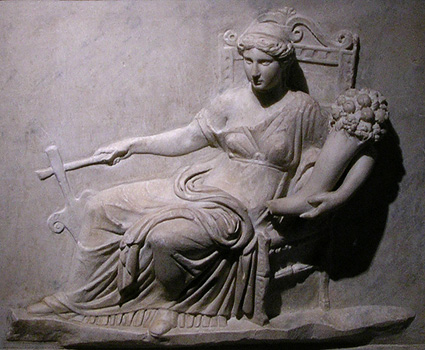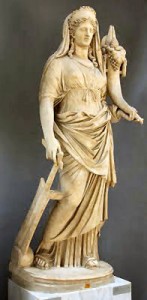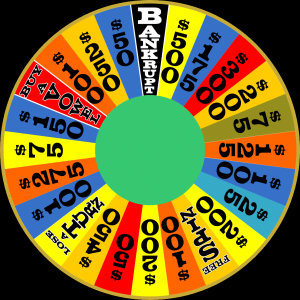In The Merchant of Venice, Portia, an affluent and quick-witted heiress from Belmont, aids in rescuing Antonio from his legal plight with Shylock. The fates of people around Portia shift constantly, while her situation generally improves without problem. Portia’s actions through the play embody Fortuna’s whimsical interest in humanity.
In order to compare Portia and Fortuna, we need a little background on this mythical figure and her famous wheel. In Roman mythology, Fortuna was the goddess of Luck, Fate, and Fortune. She watched over the fate of the individual as well as the state. In her left hand, Fortuna usually held a cornucopia, a symbol of all good things flowing in abundance. In the other hand, Fortuna held a ship’s rudder, which implied her power to steer the delicate lives of mortals. By using both objects, she was able to either bring happiness to the person’s life, or completely destroy the individual’s life instead.
Associated with Fortuna was her Rota Fortunae (Latin for “wheel of fortune”), which was a medieval concept that involved the use of a wheel that a person symbolically rode during his or her life. At the top of the wheel, a person’s lifestyle was full of happiness and leisure. A individual at this level would live like a king. However, the wheel would eventually rotate and the person would begin to endure a miserable existence, full of pain and tragedy. Someone at the bottom hoped that Fortuna would eventually spin her wheel often enough for the individual to come back on top, both metaphorically and financially.

La Rota Fortunae – notice the position of the individuals at the top and bottom of the wheel as Fortuna in spins the wheel.
Portia, true to her allegorical figure, jumps at the opportunity to rescue Antonio from Shylock during the trial scene, spotting it as a situation where she can spin her metaphorical wheel and dramatically alter the fates of the people involved. By indirectly offering to pay more than triple the amount Bassiano borrowed from Shylock, Portia’s act symbolizes the cornucopia in Fortuna’s left hand.
The parallel between Portia and Fortuna also shows up in the last scene of the play. After revealing that she had been the lawyer during the trial in Venice, Portia hands Antonio a sealed letter:
“Unseal this letter soon; There you shall found three of your argosies, Are richly come to harbor suddenly. You shall not know by what strange accident, I chanced on this letter.” (V.I.295-297)
Portia claims to have discovered the news herself without any external help, which leads me to see a further connection between her and the concept of Fortuna. Antonio, whose ships disappeared through fortune, is finally rewarded with the return of his ships after the terrible trial with Shylock. Maybe Fortuna’s wheels rotated even more for Antonio, elevating him to an even higher level of wealth because his ships came back to harbor. Like the rudder in Fortuna’s hands, Portia’s letter embodies Fortuna’s jurisdiction over a mortal’s life.
Today, the “wheel of fortune” is probably most well known to people as the popular television show hosted by Pat Sajak. While the element of luck will not have much of an effect on a person’s life, the game show does at least guarantee a brief period of pleasure for the winning contestant, either through fabulous vacations or enormous sums of money. But who knows, maybe the spirit of Fortuna does grease the wheel of “fortune” of the winners, imbuing them with success.
Sources:
1. Took, Thalia. “Fortuna, Roman Goddess of Luck, Chance, and Fortune.” The Obscure Online Goddess Dictionary.. Web. 14 July 2015.
2.Caldwell, Ellen M. ‘Opportunistic Portia As Fortuna In Shakespeare’s Merchant Of Venice’. SEL Studies in English Literature 1500-1900 54.2 (2014): 349-373. Web. 15 July 2015.



